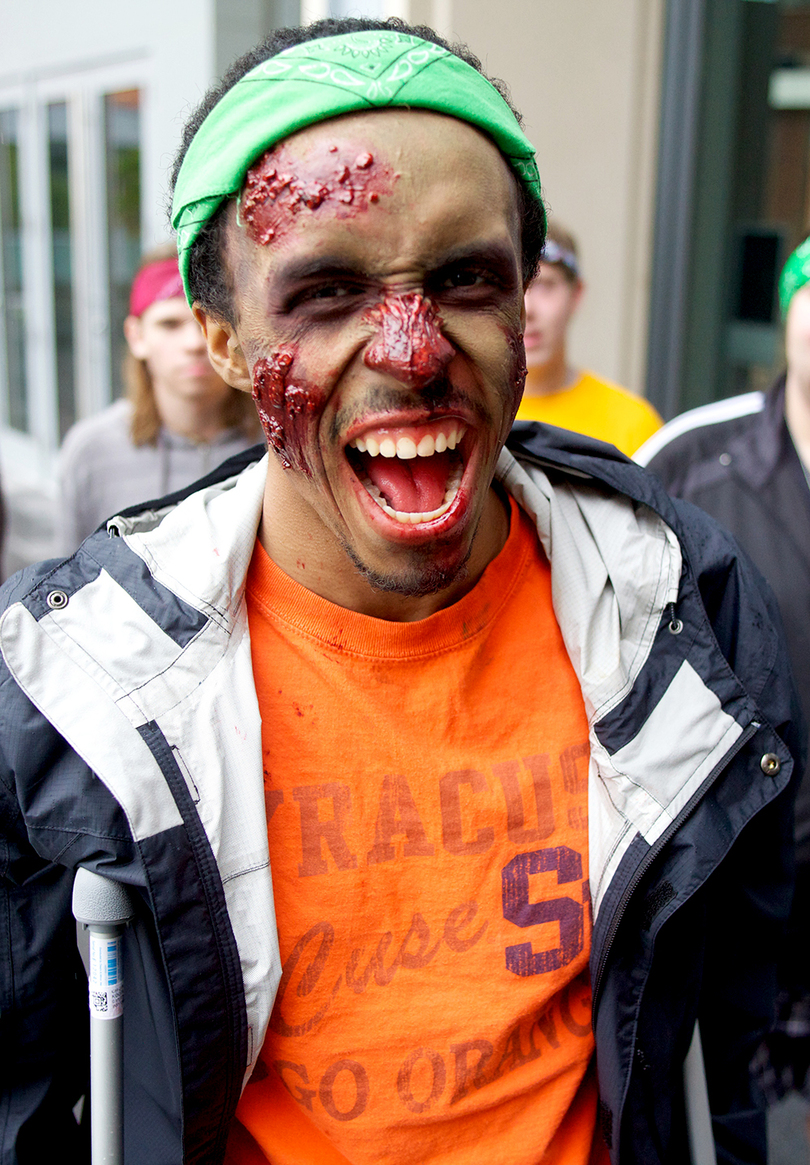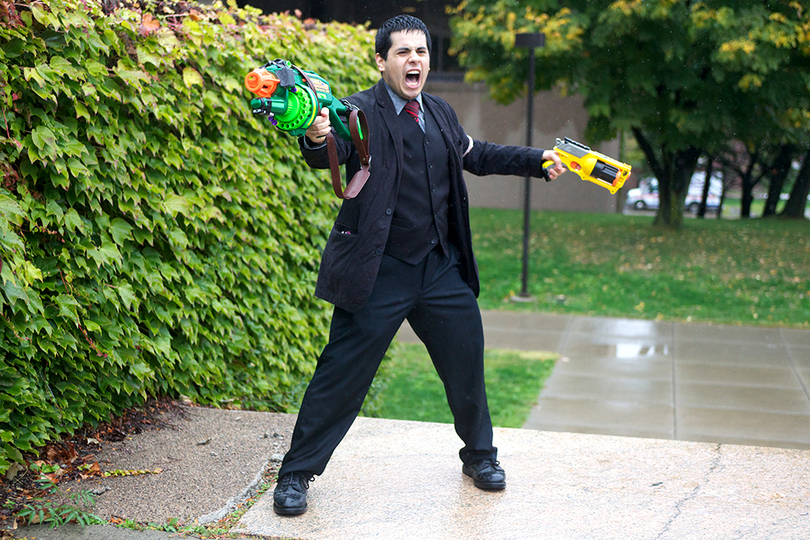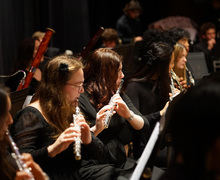Zombie nation: Students battle undead outbreak in campus game of tag
When class gets out, the last thing students expect is to find someone in a headband and zombie makeup. Or seeing people walk across the Quad with armbands carrying Nerf guns, looking around stealthily. For those in Humans vs. Zombies, this is all a part of the experience, and the fun of the game.
Sunday marked the time to put away those Nerf guns, as four humans fell to about 20 zombies. The Endgame, which started at about 5 p.m., was the humans’ last mission to find a “helicopter” — a safe zone from their living-dead counterparts.
But despite their best efforts, the zombies shambled away with a win.
Founded in March 2010, Humans vs. Zombies is now a game with an active participation of 60 to 70 students. The number ranges depending on who is free during the missions. It’s a game that is open to both the State University of New York College of Environmental Science and Forestry and Syracuse University students. Many people start off as humans with armbands and they carry Nerf guns.
Humans vs. Zombies is similar to tag. The zombies wear colored headbands and have to tag out the humans. Also, the zombies can wear zombie makeup.
“I feel that most of my friends at this school are from Humans vs. Zombies,” said David Teetz, a junior aerospace engineering and applied math dual major, and one of the administrators for the group. “It’s just really fun, and everyone who does it is great.”
Each game lasts about a week, depending on how well each side plays. The game lasts during and in between classes, and humans can be tagged going to and from class.
Many members feel that one of the best parts of the game is the paranoia players experience during the game. A human could be on his or her way to a class and suddenly be ambushed by a group of zombies. When the player is a zombie, many members enjoy the excitement of scaring and surprising the human players.
“In every game I have been in, for at least one mission per game, a group of humans and I abandon the mission because the zombies outnumber the humans,” said Michael Auyeung, a sophomore forensic science major and fellow administrator. “We have run back to our dorm with the hoard hounding on us.”
The team also does various missions throughout the week, such as scavenger hunts and different tasks, all the while being chased by the zombies.
Sometimes, these missions can be very intense, and there are a few experiences that stick out in some players’ minds.
“The Saltine Massacre was a mission that went totally wrong,” Christopher Debany said. “The humans needed to get near Carnegie, but the zombies moved our objectives. So when we got there, we just got attacked. Only three out of the 20 humans ended up surviving, I think.”
The players can be seen running around all of the SU campus and have built an excellent rapport with the Department of Public Safety.
“Before the beginning of each game, we always contact DPS and explain to them that we are having the game during a certain week, and we usually get an OK with them with no problem at all,” said Dwaine Perdomo, a senior civil engineering major and another one of the administrators.
Humans vs. Zombies can’t be played on ESF’s campus, however. Chief of University Police at ESF Scott Becksted told the group that the game creates a safety issue, as students could get hurt while running around the school.
The group is adamant on making sure everyone feels and is safe, both the players and others on campus. Administrators make sure that everyone is following the rules and has the correct equipment, and they have not had any major safety issues to deal with so far.
Even though ESF does not allow the game to be played on its campus, ESF students can join the group and many are active members.
Overall, the group feels that it’s a great way to meet people from both campuses.
“Basically, Humans vs. Zombies is like a melting pot of people from the two schools that are in the game,” Auyeung said.
The game ends with a final mission called Endgame, which determines whether the humans or zombies win.
There is currently a Facebook group called “Syracuse Humans vs. Zombies: the Game/Interest Group,” but administrators plan to revamp their presence on social media. They plan on starting a page that will allow them to choose which content gets posted on the wall, as important posts about mission times can get swallowed up by other posts by the group.
The group also has big ideas for the future.
“We are working on getting club status,” said Emily Ballard, another administrator and sophomore international relations and policy studies dual major.
By having club status, the group could be able to have things such as certified zombie headbands and be able to post on bulletin boards around campus. Also, it would allow them to do things that the founders had been discussing since the beginning, such as playing in the Carrier Dome, Perdomo said.
“And of course we will continue training in preparation for the zombie apocalypse,” Ballard said.
Published on October 1, 2012 at 2:58 am
Contact Claire: cmdunder@syr.edu | @ClaireDunderman







